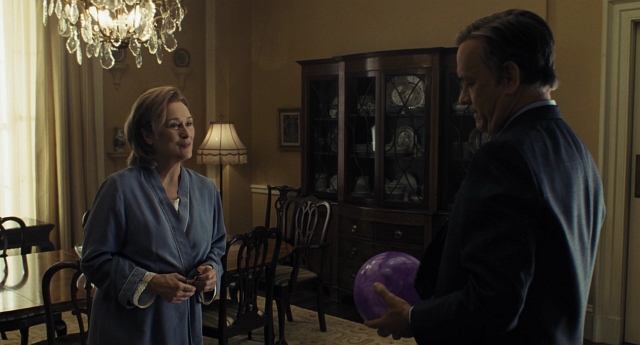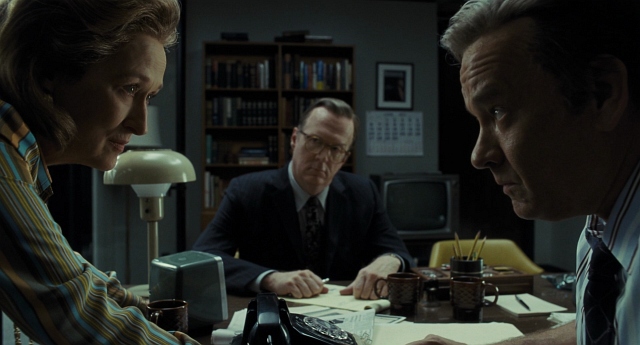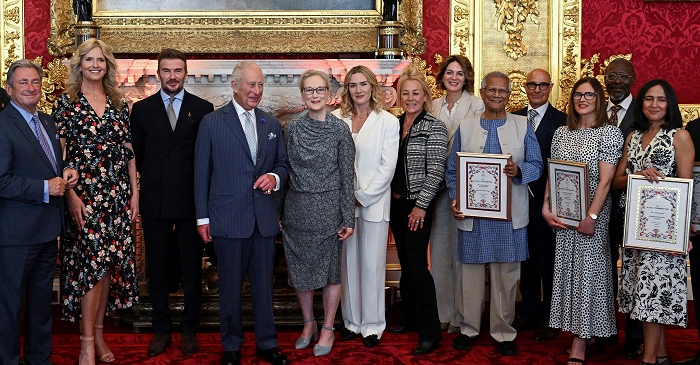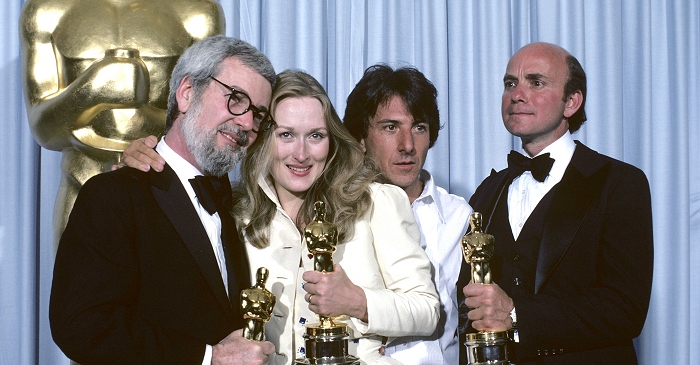|
Simply Streep is your premiere online resource on Meryl Streep's work on film, television and in the theatre - a career that has won her acclaim to be one of the world's greatest living actresses. Created in 1999, Simply Streep has built an extensive collection over the past 25 years to discover Miss Streep's body of work through thousands of photographs, articles and video clips. Enjoy your stay and check back soon.
|
The Post
December 22, 2017
· Dream Works Pictures
· 116 minutes
|

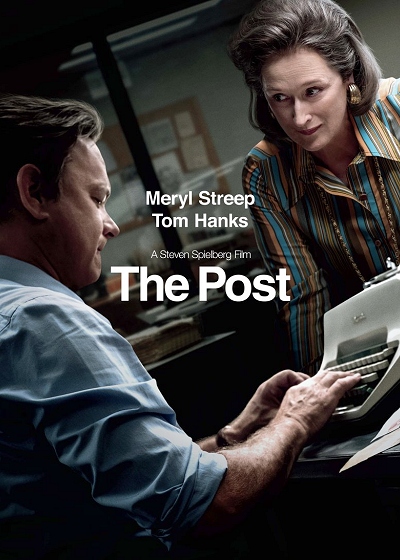
45 years after making a decision that eventually ended the Nixon presidency, Katharine Graham is getting her due on the big screen, as the woman who, at a critical moment, did the right thing for a free press and the Constitution. At the time, her executive editor, Ben Bradlee, was given the credit, and Alan Pakula’s 1976 movie of Bernstein and Woodward’s account, All the President’s Men, was a macho affair in which she was all but airbrushed out of history. For Spielberg, whose film unites Streep and Tom Hanks for the first time on-screen, the emphasis is different. The project, he says, chose him rather than the other way around. “There are some stories that just don’t leave your consciousness, and this was one of them,” he says. “By becoming the first female publisher of a major newspaper, Graham set a new bar for women everywhere, and she was the first of her generation to show people that in the face of enormous pressure, being a bystander was not an option—and it still isn’t.”
Katharine Graham was often said to be one of the most powerful women in America. Characteristically, she hated the phrase; she said it made her sound like a weightlifter. She did, nevertheless, exercise great influence as the publisher of the Washington Post in its greatest days and as the president and later chief operating officer of the Washington Post Company, which also owned Newsweek magazine and a number of television and radio stations; they prospered exceedingly both editorially and as businesses under her leadership. Her success as one of the first women to be a major business leader in the US was all the more remarkable because it was thrust on her in early middle age by the suicide of her husband. Warned by all her worldly-wise friends to leave the business, owned by her father before it passed to her husband, to be run by others, Graham decided that she owed it to her children to take over. She did this to such effect that she steered the paper through its transformation into a public company in 1971 and through violent strikes against new technology. “Though it took me a long time to throw off my early and ingrained assumptions,” she wrote in 1997, in her notably frank and highly successful autobiography, “I did come to understand the importance of the basic problems of equality in the workplace, upward mobility, salary equity and more recently child care.”
I am entranced by her energy, mind, grace, humor, and humility. Qualities in such short supply these days. (Meryl Streep, Vogue, December 2017)
During the Watergate crisis, Graham forged a close relationship with Ben Bradlee, the tough, salty-spoken editor she had brought across from Newsweek. Although not directly involved – as she had been in the Pentagon Papers fight, when she personally took the crucial decision to publish the documents – she identified totally with the Post’s investigative reporting. Later, however, she surprised many and disappointed some by forming close friendships with Henry Kissinger and his wife Nancy, and later with Ronald and Nancy Reagan. It would seem that, like many “neo-conservatives” who moved to the right as a result of the wild confrontational politics of the 1970s, Graham’s New Deal loyalties were shaken by her confrontation with the unions, in which the pressmen, in particular, used violent tactics and threatened even uglier attacks. Certainly, one of her strongest motivations was her commitment to her family and to the media and business empire her father and then her husband had built. It was a great pleasure for her that her daughter, Elizabeth “Lally” Weymouth, worked at the paper before building a career as a freelance journalist, and an even greater satisfaction to be able to hand over the post of chief executive officer of the Washington Post Company in 1991 to her son Don, who had come to the paper only after serving in Vietnam and then working as a District of Columbia police officer.
★ National Board of Review – Lead Actress
★ Detroit Film Critics – Ensemble
★ North Texas Film Critics – Gary Murray Award (Best Ensemble)
★ Academy Award – Best Performance by an Actress in a Leading Role
★ Golden Globe – Best Performance by an Actress in a Motion Picture (Drama)
★ AARP The Magazine Grownups Award – Best Lead Actress
★ Alliance of Women Film Journalists – Best Ensemble Cast
★ Broadcast Film Critics – Lead Actress
★ Broadcast Film Critics – Ensemble
★ Central Ohio Film Critics Association – Best Ensemble
★ Critics Choice Movie Award – Best Actress
★ Chicago Independent Film Critics – Best Ensemble Cast
★ Dallas-Fort Worth Film Critics Association Award – Best Actress (5th Place)
★ Denver Film Critics – Best Actress
★ Detroit Film Critics – Best Ensemble
★ Faro Island Film Festival – Favorite Actress
★ Georgia Film Critics – Ensemble
★ Indiana Film Journalists Association – Best Ensemble Acting (2nd Place)
★ Cinema’s Jupiter Award (Germany) – Best International Actress
★ North Texas Film Critics – Lead Actress (2nd Place)
★ North Carolina Film Critics – Best Actress
★ Ohio Film Critics – Ensemble
★ Online Film & Television Critics Association – Best Actress
★ Online Film & Television Critics Association – Best Ensemble
★ Online Film Critics Society – Best Ensemble
★ Phoenix Film Critics – Best Ensemble Acting
★ San Diego Film Critics – Best Ensemble
★ St. Louis Film Critics – Best Actress
★ Seattle Film Critics – Best Actress
★ Seattle Film Critics – Best Ensemble
★ Southeastern Film Critics Association – Best Ensemble (2nd Place)
★ Washington Film Critics – Best Actress
★ Washington Film Critics – Best Ensemble
★ Womans Image Network – Best Actress Feature Film




